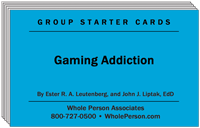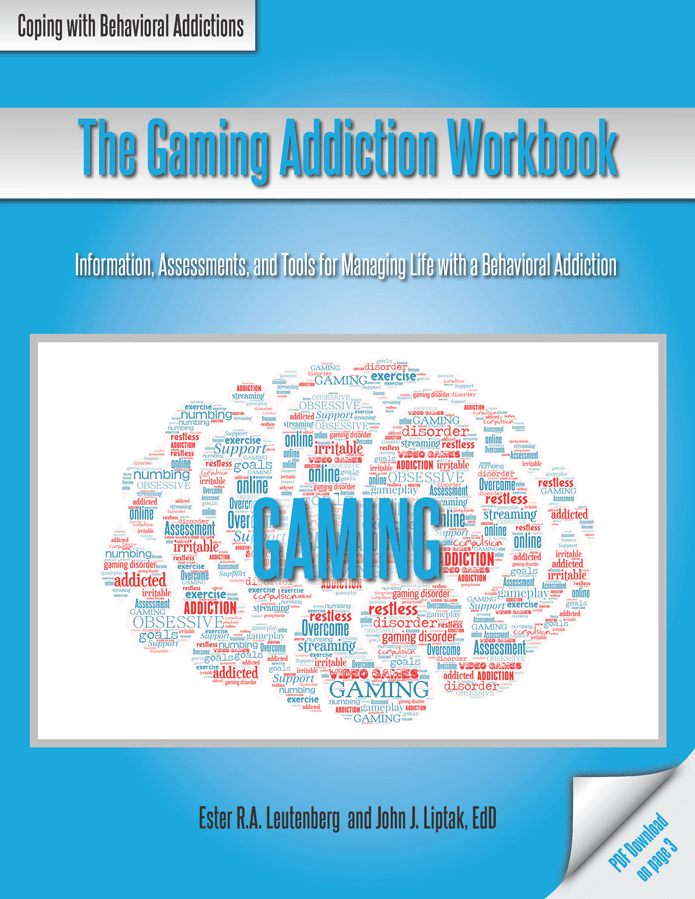Gaming Addiction
Video game addictions, also known as gaming disorders or internet gaming disorders, are generally defined as a problematic, compulsive use of video and/or internet games that significantly impair a person's ability to function in various life domains over a prolonged period of time. The American Medical Association (2007) defines heavy game use as playing video games for more than two hours per day. Estimates of the amount of time gamers spend playing video games vary from 6 to 12 hours per week. Some reports suggest that gamers spend about a quarter of their leisure time playing video games.
As with all types of behavioral and physical addictions, the possibility of a video game addiction is determined by the amount of time spent gaming and the function it is serving the individual. Like other recreational activities, video game playing may not be harmful or indicate an addiction. However, when game playing becomes addictive, it can take over as the person's primary way of coping with life, with other essential areas of life being neglected or disrupted.
The Gaming Addiction Workbook aims to provide helping professionals with cognitive and behavioral assessments, tools, and exercises to treat the root psychological causes of gaming addiction. It is designed to help people identify and change negative, unhealthy thoughts and behaviors that may have led to gaming addiction. The activities in this workbook can help participants identify the triggers that can lead to a preoccupation with playing video games and teach them ways to overcome and manage those triggers.
The Gaming Addiction Workbook will help participants to:
- Build self-esteem in positive capabilities outside of playing video games.
- Develop greater self-acceptance and the ability to change ineffective behaviors.
- Learn ways to live a new life without a preoccupation with video games.
- Recognize that they are experiencing an addiction problem.
- Reflect and become aware of the behaviors that were part of and arose from the addiction.
- Understand the triggers for preoccupation with video games.
- Understand recurring patterns that indicate a gaming addiction.
The Gaming Addiction Workbook is a practical tool for any professional working with people living with behavioral addictions. Depending on the person's role using this workbook and the specific group or individual's needs, the modules can be used individually or as part of an integrated curriculum. Use one activity in a group or several assessments in a workshop.
The Five Modules
This workbook contains five separate modules of activity-based handouts that will help participants learn more about themselves and their addiction to playing video games. These modules serve as avenues for self-reflection and group experiences revolving around topics of importance in the lives of the participants in the group.
The activities in this workbook are user-friendly and varied to provide a comprehensive way of analyzing, strengthening, and developing characteristics, skills, and attitudes for overcoming an addiction to video games.
This workbook's activities, handouts, and assessments are entirely reproducible and can be photocopied and/or revised for direct participant use.
Module 1: My Gaming Addiction
This module helps participants explore their symptoms related to their gaming addiction, amounts of time spent gaming, and how gaming is causing problems at work, in school, with friends and families, and with finances.
Module 2: Develop a New Lifestyle
This module helps participants explore how important it is to investigate and develop a new type of lifestyle, explore and become aware of one's skills and abilities, step up self-esteem, set goals, and find other meaningful, enjoyable activities.
Module 3: Socialization Skills
This module helps participants examine the amount of non-gaming socialization they are currently experiencing, the social skills they lack, and ways to become more social with people, develop face-to-face relationships, and build on existing relationships.
Module 4: Self-Control
This module helps participants explore how well they can control compulsions, impulses, and urges to play video games, how much self-control they currently have, and ways of developing increased willpower, impulse control, and discipline.
Module 5: Healthy Balance
This module helps participants discover ways to promote a healthy and productive future, explore ways that gaming has impaired their lives, develop coping skills, set limits on the amount of time they spend gaming, explore the consequences of their gaming behavior, and make healthier choices.
PDF Worksheets - With the purchase of this workbook, you also get access to a PDF download of the included worksheets.
 Gaming Addiction Card Deck
Gaming Addiction Card Deck
Using the Discussion Starter Card Deck will break the ice, encourage openness, and help introduce a specific subject. Activity handouts included in these workbooks are reflective, easy-to-use exercises, presented in a variety of formats to accommodate multiple intelligences and different learning styles. Each question corresponds to a page in the workbook.



